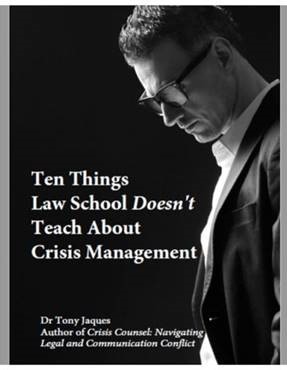


Should Legal Advice Take Precedence in a Crisis?
Our good friend and colleague, Dr. Tony Jaques, is a prolific writer and commentator on risk, issues and crisis management. Based in Melbourne, Australia, he consults and has written three books in the field, also producing his must-read newsletter, Managing Outcomes.
Tony’s latest book is titled Ten Things Law School Doesn’t Teach About Crisis Management. Read below to see how you can receive a free copy.
Should Legal Advice Take Precedence in a Crisis?
Lawyers are involved in just about every serious organisational crisis. Yet how much specific training do they receive about their role in a crisis as part of a cross-functional response team? And how should they work with communicators and designated crisis managers?
The idea of lawyers taking the lead in a crisis and reputation management is gradually emerging, mainly among lawyers themselves.
For example, a recent article in the Association of Corporate Counsel Docket argued that Chief Legal Officers are “uniquely positioned within the organization” to lead the effort when reputation is at risk.
A report in Global Legal Post in December argued the General Counsel role had “evolved to include crisis leadership” with GCs expected to protect their company’s reputation and minimise disruption.
And the Financial Times in September featured the headline “How general counsel became the corporate ‘voice of conscience’.”
Turning specifically to crisis management, a similar sentiment was revealed in the findings of my research in partnership with SenateSHJ and its PROI overseas network. Experienced crisis lawyers in Australia, New Zealand, UK, Canada and the US were interviewed, and a majority said it is lawyers who should take the lead in a crisis (click here for the full report).
However, independent legal experts and proficient crisis managers tend to agree it’s often best if the lawyer is not in charge.
For example, the late Washington DC-based attorney and crisis authority Richard Levick believed it came down to the question: Who’s driving the bus? “Legal counsel in a crisis is essential and needs to be on the bus,” he wrote. “But unless legal exposure is the single greatest market cost, it shouldn’t be driving the bus.”
Professor Daniel Diermeier, formerly of the Kellogg School of Business at Northwestern University, is unequivocal about the topic: “Good crisis management teams have a strong, opinionated General Counsel, while poor crisis management teams are run by the General Counsel.”
A few years ago PR Daily put it even more bluntly with the headline: “Why your lawyers can make your crisis worse.”
But none of this helps lawyers and communicators work better together when a crisis strikes.
My new e-book – Ten Things Law School Doesn’t Teach About Crisis Management – aims to help strengthen that working relationship. The book addresses some of the principles underlying effective crisis response, including “What’s legal isn’t always what’s best” and “Apologising is not kryptonite for lawyers” and “Perception IS reality” and “Legal counsel should sometimes be ignored.”
I use new and classic case studies to illustrate some of the core challenges between the professions. I also highlight that lawyers and communicators work for the same organization and are in the same business — communication — though they do it for different reasons and typically communicate with different audiences. Most importantly, they both believe they are acting in the best interests of the client.
The truth is that lawyers and communicators need each other. They have no option but to co-operate if crises are to be effectively managed and the client’s reputation protected as far as possible.
Thom Fladung, managing partner of Hennes Communications, wrote a hopeful piece titled: “Cats Sleeping With Dogs: How Lawyers and Crisis Communicators Can Work Together.”
Thom is right . . . but it takes real effort on all sides.
For your free copy of Ten Things Law School Doesn’t Teach About Crisis Management, send your name and email to orders@issueoutcomes.com.au
